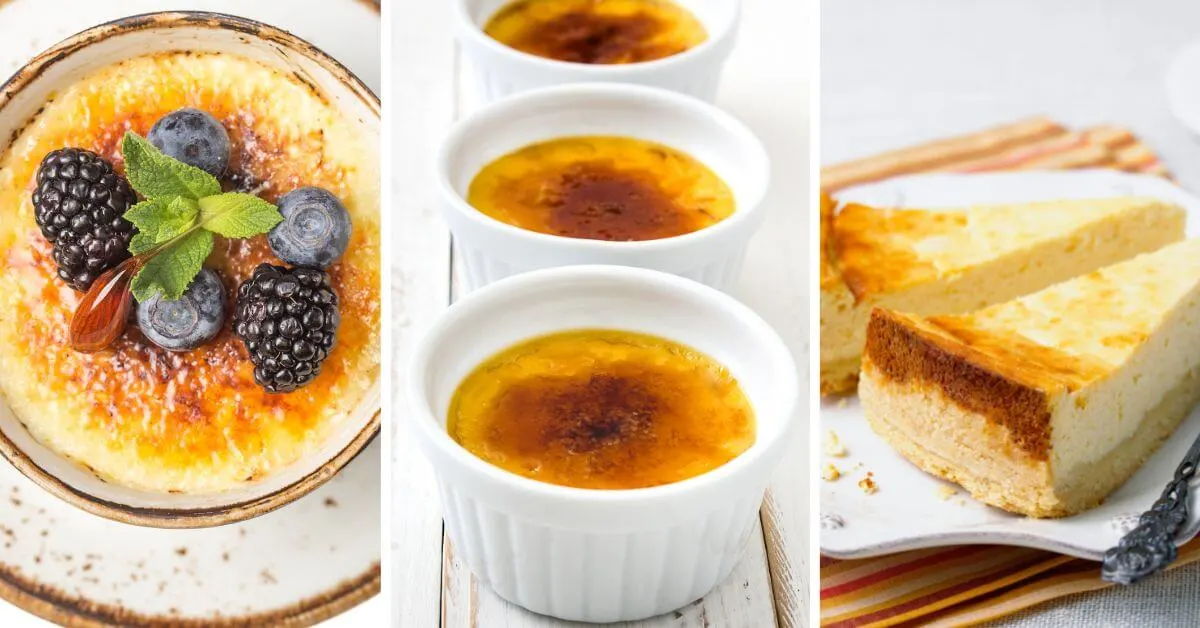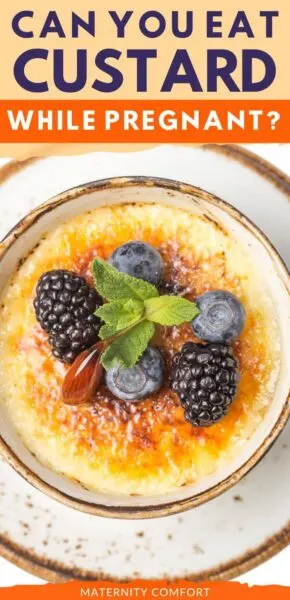Updated May 8, 2023
Timeless and classic Custard desserts like creme brulee, cheesecake, and flan have been family favorites for ages, but is it safe to eat custard during pregnancy?
If you are pregnant and love to indulge in custard-based desserts on occasion you may be wondering or worrying.
You are not alone!

Quick story…It was my birthday, and I was celebrating by eating red velvet cheesecake at the Cheesecake factory. I love that stuff!
As I savored every bite, I couldn’t help but notice how good it tasted – even better than usual.

I chalked it up to the joy of celebrating my birthday, but as the day went on, I started to feel a little weird. I was more tired than usual and felt a little queasy.
Long story short turns out I was pregnant and then a little freaked out because I ate red velvet cheesecake and was that safe?
Everything turned out fine, but it was a little disconcerting at the time,
Pregnancy is an exciting, but very often confusing time.
What you can eat, what you can’t eat, what you should eat, and what you shouldn’t eat while pregnant are looming questions that pregnant women face every day.
Sometimes the answer isn’t a straightforward yes or no when it comes to foods safe to eat during pregnancy.
Custard is one of those foods.
The answer to the question is a little complicated, so let’s dig into the most common types of custards, how they are made, and see if they are safe or not.
There are some types of custard that are safe to eat during pregnancy, while others are not.
In this article, we will discuss the safety of eating custard during pregnancy and provide some tips for pregnant women who want to enjoy this delicious dessert!
What is Custard?
Custard is a sweet, creamy dessert made with eggs, milk, cream, and sugar.
It can be flavored with vanilla, fruit, or spices and is often used as a filling for pies or pastries.
Custard can also be served on its own as a pudding or parfait.
There are two main types of custard: cooked [Baked until firm] and uncooked [Heated on the stove-top and remains pourable or soft].
Cooked custard is made by baking eggs and milk in the oven until it thickens and becomes firm all the way through.
Uncooked or stirred custard is made with eggs that are heated but not cooked all the way through., which can make it unsafe to eat during pregnancy.
Is it safe to eat Custard during pregnancy?
Yes, it is safe to eat cooked custard during pregnancy.
As we mentioned before, there are two main types of custard: cooked and uncooked.
Cooked custard is safe to eat during pregnancy.
When we say cooked eggs, we mean the dessert was baked until the custard is firm.
It is not runny, wobbly, or liquid-like in the middle.
Examples of desserts made with cooked custard:
- Crème Brulee:
Crème Brulee is a classic French dessert that consists of a rich custard base topped with a layer of hard caramel.
The custard is usually made with heavy cream, eggs, sugar, and vanilla extract, and it is baked in a ramekin or baking dish until set.
Once it is cool, the caramel topping is created by sprinkling sugar over the top and then burning it with a kitchen blowtorch.
This process melts the sugar and makes a crispy, crackly topping.
Crème Brulee is typically served cold or at room temperature, and it can be garnished with fresh fruit, chocolate shavings, or whipped cream.
- Pot de crème:
A pot de crème is a type of custard that is typically made with eggs, milk, and cream.
It is usually flavored with chocolate or vanilla, but other flavors can also be used.
The custard is usually baked in individual ramekins or pots, which is why it is called “pot de crème.”
While the custard can be served on its own, it is often garnished with whipped cream, chocolate shavings, or fruit.
Pot de crème originated in France, and its name literally means “pot of cream.”
It is a popular dessert that can be found in restaurants and cafes across the country.
- Flan:
Flan is a type of custard that can be either savory or sweet.
It is typically made by combining eggs, milk, and sugar, and then baking it in a water bath until it sets.
The finished flan will have a smooth texture and a caramelized top.
Flan can be served on its own or with fruit, whipped cream, or ice cream.
It is a popular dessert in many parts of the world, including Latin America, Spain, Portugal, and the Philippines.
- Cheesecake:
Cheesecake is a delicious dessert that consists of a rich, creamy filling sandwiched between two layers of flaky pastry.
The filling is usually made from a mixture of cream cheese, eggs, sugar, and vanilla extract, and the pastry can be either shortcrust or puff.
Cheesecake is often served with a fruit topping, such as strawberry or raspberry coulis.
There are many different varieties of cheesecake, including
New York-style cheesecake, which is rich and dense, and Italian-style cheesecake, which is light and airy.
Other popular flavors include chocolate, lemon, and pumpkin.
Uncooked custard is made with raw eggs and is not safe to eat during pregnancy.
When we talk about uncooked custards that include custards that are heated on the stove-top but are not cooked through.
If it is a custard sauce or if it wobbles in the middle, it is not safe to eat during pregnancy.
The only exception to this might be commercially-made custards that are pasteurized.
But our OB/GYN Dr. Doug Penta, MD, believes pregnant women should avoid all homemade or restaurant “creamy” custard desserts or custard sauces that were made with raw eggs. If the custard dessert is not “firm” and cooked through it is not safe to eat while pregnant.
That puts Boston cream donuts and chocolate eclairs in the not safe to eat while pregnant category too.
It isn’t worth the potential risk to you or your unborn baby.
Raw eggs can contain harmful bacteria (Salmonella) that can make you sick.
Examples of desserts made with uncooked custard:
- Creme Anglaise:
Creme Anglaise is a French custard sauce made from egg yolks, sugar, and milk.
It is usually flavored with vanilla, though other flavors such as chocolate or fruit can be used.
The sauce is thickened with flour or cornstarch and cooked over low heat until it reaches a thick consistency.
Creme Anglaise can be served on its own or used as a base for other desserts such as ice cream, pudding, or cake.
It is also a popular topping for fruit pies and tarts.
Because of its rich flavor and creamy texture, Creme Anglaise is one of the most popular custard sauces in France.
- Boston Cream:
Boston Cream is a filling traditionally used in Boston Cream Pie.
It is made from a vanilla custard or crème pâtissière.
The custard is then poured into a prepared pastry shell and refrigerated until set.
The custard is not baked until firm or set, therefore it should be avoided during pregnancy.
Pregnant women are more susceptible to foodborne illness, so it is important to avoid “uncooked” pourable custards.
If you are pregnant and crave a delicious custard dessert, there are plenty of recipes for cooked custard that you can enjoy.

Tips for Pregnant Women Who Love Custard
If you are pregnant and want to enjoy a delicious custard dessert, there are plenty of recipes for cooked custard that you can enjoy!
Here are a few tips to help you make the best choice for yourself and your baby:
- Check the recipe to make sure it uses cooked eggs.
- If you are unsure, ask your doctor or a registered dietitian for guidance.
- When in doubt, throw it out! If you are ever unsure about whether a food is safe to eat during pregnancy, it is always better to err on the side of caution and avoid it.
Is homemade custard safe in pregnancy?
It depends. If it is cooked custard and if it is firm and set (think cheesecake, flan, and creme brulee) it is considered safe during pregnancy.
We would suggest that if you made the cooked custard dessert, it is likely safe.
But it may be wise to pass on homemade desserts at parties, potlucks, and even smaller restaurants.
The risk of Salmonella while low is still too high for pregnant women.
During pregnancy, your immune system is weakened which put you more at risk of developing a foodborne illness.
Does custard have raw eggs?
Yes, custard desserts are made with raw eggs.
Do not consume raw or undercooked eggs during pregnancy.
Custard desserts are considered safe to eat during pregnancy is they are cooked/baked until they are no longer in a liquid form.
Most Common Food-Borne Illnesses
- Listeria
- Salmonella
- E Coli
- Mold
- Campylobacter
- Botulism
These pathogenic bacteria can be found in foods that are not kept at the proper temperature, stored improperly, or that are undercooked.
To reduce your risk of foodborne illness during pregnancy you want to pay close attention to how you prepare, cook and store the foods you eat
Common symptoms of foodborne illness from undercooked meats are:
- Nausea
- Vomiting
- Diarrhea
- Stomach cramps
- Fever
List of foods to not eat when pregnant:
- Foods that are not pasteurized– certain types of cheese like soft cheeses, Brie, Blue Cheese, etc.
- Certain types of fish– shark, swordfish, anything high in mercury
- Raw eggs including egg nog, hollandaise sauce, homemade mayonnaise, homemade eggnog, and runny eggs.
- Undercooked meats– lunch meats. Deli meats.
- Hot foods that are not “hot”, avoid hot foods that have been sitting out without a warming source. Same for foods that should be eaten cold. If no ice or refrigeration source keeps the food cold, take a pass.
- Caffeine– soda, chocolate, and energy drinks. (Limit your caffeine to less than 200 mg a day)
- Herbal Teas (There are so many ingredients in herbal teas so it is best to avoid them simply. Green tea is OK.)
- Alcohol: There is no known safe amount of alcohol during pregnancy. Avoid sauces made with alcohol, desserts made with alcohol, and all alcoholic beverages.
List of Foods you should eat during pregnancy:
- Avocado
- Oatmeal
- Pinto Beans
- Black beans
- Arugula
- Bananas
- Dark Green Leafy Vegetables
- Brussel sprouts
- Carrots
- Green Beans
- Eggs
- Lean Meats
- Apples
- Oranges
- Salmon
- Shrimp
What should a pregnant woman eat daily?
A pregnant woman needs to consume various nutrients every day to support her health and the development of her baby.
Protein is essential for building new tissue and can be found in meat, poultry, fish, legumes, and eggs.
Calcium is necessary for strong bones and teeth and is especially important during the third trimester when the baby’s skeleton is rapidly developing.
Pregnant women should aim to get 1000 mg of calcium per day from low-fat dairy products such as milk, yogurt, and cheese.
Iron is also important for the formation of new blood cells, and pregnant women need about 27 mg of iron per day.
Final Thoughts
Custard has been around for centuries and was first mentioned in cookbooks in the 1300s.
The dish likely originated from medieval England, where cooks would thicken boiled milk with ground rice or bread crumbs.
Eggs were later added to give the custard more richness and flavor.
Today, custard can be made with many different ingredients, including vanilla extract, cinnamon, nutmeg, and chocolate chips.
Custard is safe to eat during pregnancy when it is cooked properly.
The main concern with eating custard during pregnancy is the risk of salmonella poisoning.
Salmonella bacteria can cause food poisoning and this can be dangerous for both the mother and her baby.
Salmonella poisoning can be prevented by making sure that the custard is cooked correctly.


